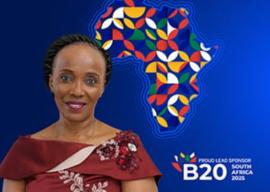
Call to advance financial inclusion for women
Call to advance financial inclusion for women Minister of Women, Youth and Persons with Disabilities Sindisiwe Chikunga has emphasised the importance of collaborative ecosystems in driving successful and resilient women-owned businesses across Africa. Addressing the Group Twenty (G20) Empowerment of Women Working Group (EWWG) Women to Africa event, held in Johannesburg on Friday, Chikunga said governments, including private sector, development institutions, and women entrepreneurs, should work together to advance financial inclusion for women. “No economy can claim resilience if more than half its people — women, young and old — remain locked out of markets, of finance, of safety, and of dignity,” the Minister said. Under South Africa’s G20 Presidency, the EWWG prioritises the care economy, financial inclusion for women and ending gender-based violence and femicide (GBVF). “These priorities sit firmly within Africa’s broader G20 Presidency agenda — reforming global governance institutions, financing sustainable development and climate action, driving inclusive growth and job creation, harnessing digital transformation, and building peace and resilient societies. None of these can succeed if women are left behind. “At the continental level, Agenda 2063 reminds us that Africa’s future will be people-driven, especially by women and young people. The African Continental Free Trade Area (AfCFTA) — the largest integration project in the world — must open its value chains to women, who already make up 70% of cross-border traders. If AfCFTA does not work for women, it will not work for Africa,” the Minister said. At the domestic level, South Africa has made progress, women now make up 43% of Cabinet, 43.5% of Parliament, and 45% of the judiciary. The new Public Procurement Act makes the 40% set-aside for women-owned businesses binding, not optional. “Yet challenges remain, 35.7% women’s unemployment, with young women above 44%; women represent less than 13% of patent holders; and the cost of GBVF drains our economy of billions each year. “These realities remind us that progress without transformation is organised inequality. And they demand that Africa’s G20 Presidency must not end with words, but with a legacy of systems that work for women,” Chikunga said. The Minister therefore called for bold shifts, not just commitments, but concrete actions. “We must finance the missing middle by unlocking affordable capital for women-owned businesses that are too big for microfinance and too small for traditional banks. “We must place women at the frontier of Africa’s new industries — from renewable energy and agritech to digital and advanced manufacturing — as leaders, owners, and innovators. “We must institutionalise accountability beyond events. Conferences do not change the world — systems do. That means setting measurable targets, enforcing fair payment norms for women-owned businesses, tracking progress publicly, and embedding zero tolerance for gender-based violence in every workplace,” the Minister said. She said these shifts are reinforced by the legacy projects of Africa’s G20 Presidency. South Africa assumed the G20 Presidency from 1 December 2024, and it will run until 30 November 2025, under the theme: Solidarity, Equality, Sustainability”. It comprises 19 countries (Argentina, Australia, Brazil, Canada, China, France, Germany, India, Indonesia, Italy, Japan, Republic of Korea, Mexico, Russia, Saudi Arabia, South Africa, Türkiye, United Kingdom, and United States) and two regional bodies, namely the European Union (EU) and African Union (AU). The G20 members represent around 85% of the global Gross Domestic Product, over 75% of the global trade, and about two-thirds of the world population. - SAnews.gov.za nosihle Sun, 08/31/2025 - 11:55 66 views